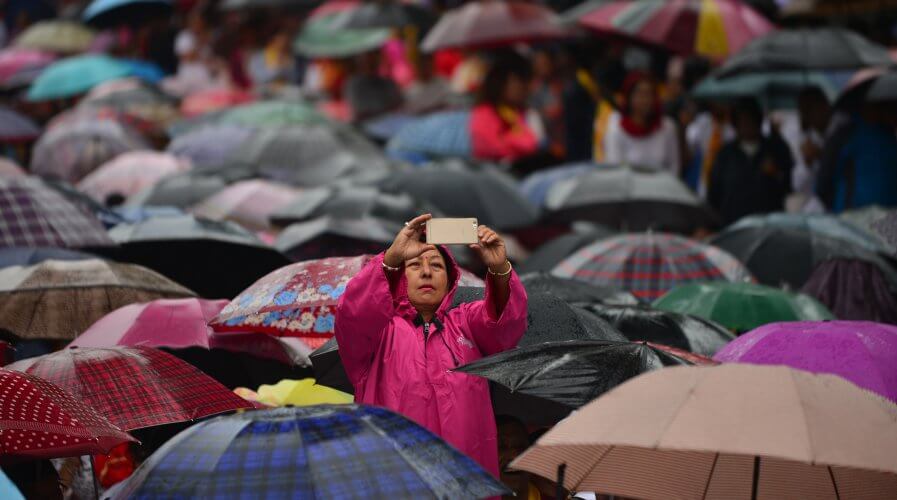
A Nepalese woman takes a photo on her phone. Source: AFP
How fintech Khalti is empowering women in Nepal
- Khalti is one of the most dominant digital payment platforms in the highland nation
- The fintech app has over 70,000 active female users, since it started prioritizing financial education & inclusion for women
Khalti means “pocket” in Nepali, and it also refers to the popular e-wallet, mobile payment gateway, and digital service provider in the former kingdom of Nepal.
Since the fintech platform launched in 2017 with just four partners who were funding it using their own money, the app has grown to become one of the most popular digital platforms in the country. Khalti has had more than 1 million downloads from the Google Play Store as Nepalis use the app to top up their mobile balance, pay internet and cable TV bills, make bank deposits and send funds to family and friends.
Since Nepal’s pandemic lockdown response in April, digital payments have surged in popularity, and e-wallets have become the best option to reload mobile credit, according to Amit Agrawal, co-founder of Khalti. “Digital wallet transaction for mobile top-up has increased by 200 to 300 percent during the lockdown period,” he said. “People are downloading digital wallet for such utility purposes.”
Shortly after the service was launched in January 2017, the founders and the team noticed that only 17% of Khalti users were female – and even most of those accounts were inactive. Agrawal says this is when the company decided to pursue more female users, and “also to empower them digitally at the same time.”
Fast forward three years after launch, Khalti now has 115 employees, and nearly half (more than 50) are women. In addition, 150,000 active users out of a total 1.2 million registered, 70,000 are female users.
This is a remarkable feat in a nation where women are not as empowered economically and socially as their male counterparts, and still face discriminative hurdles including lower-wage labor, child marriages, violence, and male-dominated traditional cultural norms.
In keeping with the team’s goals of empowering women, Khalti kicked off two projects aimed at equipping Nepali ladies with digital skills, with support from the United Nations’ Fintech Innovation Fund, the UK’s Department for International Development, and Spring, a business accelerator backed by international aid groups that is focused on the African and South Asian markets.
The ‘Smart Chori’ (‘smart daughter’ in Nepalese) campaign was introduced in July 2019. Smart Chori provides lessons on via videos, quizzes, and tasks. So far, the app has trained about 10,000 Nepali women and girls aged between 15 and 35, in financial skills and knowledge through the mobile app-based program.
Through the training and lessons in using the e-wallet to make payments and receive money, as well as the promotional offers made available in Khalti’s marketplace Bazaar, many rural communities have joined up to offer their homemade goods on the platform– and have been experiencing good sales volumes.
“We understood that a new revolution had to be initiated in Nepal to change the prospects of Nepali women,” Agrawal told Nikkei Asian Review. “The impact [of Smart Chori] has been huge as it has destroyed the stereotype that only males can pay household bills. Smart Chori teaches both children and parents that daughters are equally capable to run their homes and offices digitally.”
Khalti is also working with SABAH Nepal, a social business NGO that supports the financial inclusion of women in Nepal, to enable 3,500 women-led micro, small, and medium-sized enterprises in 12 districts across Nepal. Khalti will provide payments and other digital financial services for these SMEs.
Prior to the introduction of e-wallets like Khalti and eSewa, Nepali business people would have to travel frequently and often over large distances to make transactions or payments. Now not only can SMEs perform necessary financial transactions via the app, but they can also participate in the digital economy by selling their goods in online marketplaces like Khalti’s Bazaar.
READ MORE
- Ethical AI: The renewed importance of safeguarding data and customer privacy in Generative AI applications
- How Japan balances AI-driven opportunities with cybersecurity needs
- Deploying SASE: Benchmarking your approach
- Insurance everywhere all at once: the digital transformation of the APAC insurance industry
- Google parent Alphabet eyes HubSpot: A potential acquisition shaping the future of CRM


